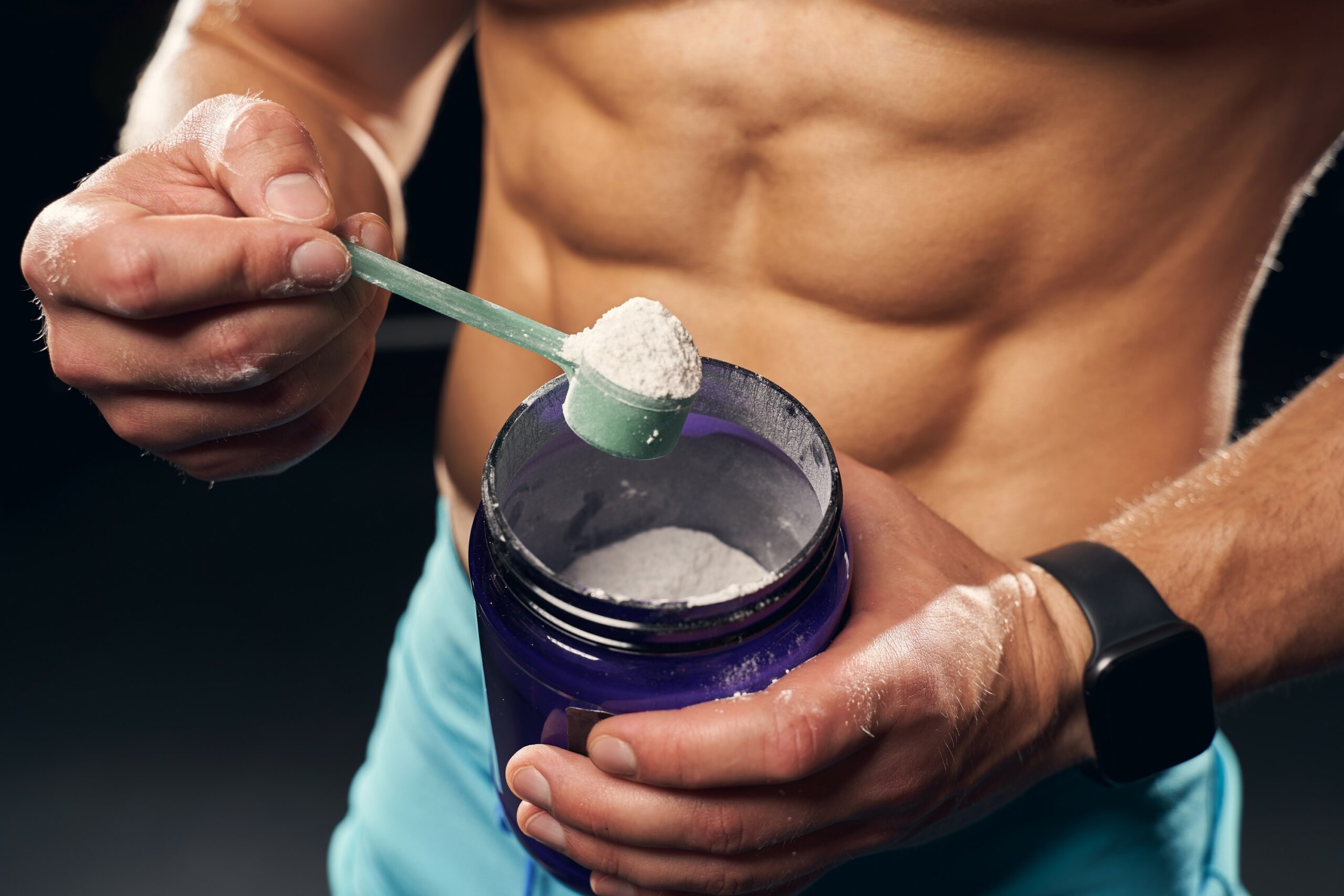
If you would like to increase muscle mass, you could buy supplements that contain citrulline, arginine, several types of protein powder and glutamine. You should also evaluate supplements that provide branched-chain amino acids, and these supplements can stimulate protein synthesis, augment muscle mass and reduce fatigue. After a workout, the supplements may also help your muscles to recover. Once you complete a training session, your workout could increase the thickness of muscle fibers, reduce adipose tissue, enhance insulin sensitivity and improve muscular endurance.
Evaluating the Benefits of Citrulline
Before a training session, you can take supplements that provide more than 1 gram of citrulline, and this amino acid could improve the volume of your muscles, reduce fatigue and increase the production of nitric oxide. Usually, nitric oxide can substantially increase blood flow to the muscles. The extra blood could deliver beneficial vitamins, important minerals and multiple types of nutrients. During a training session, nitric oxide may effectively prevent fatigue, and after a workout, citrulline could help the muscles to recover.
Read More »Selecting Protein Powder
When you are searching for protein powder, you could examine protein powders that contain extra amino acids, carbohydrates and magnesium. Usually, each serving should provide at least 20 grams of protein, and the servings can contain more than 15 grams of fiber. Typically, fiber could help your digestive system to absorb extra protein.
Examining the Effectiveness of Glutamine
Several reports have suggested that glutamine is the most prolific amino acid in muscle tissue. Glutamine can increase the sizes of the muscles, improve strength and prevent fatigue. If you take more than 500 milligrams of glutamine, the natural amino acid may also stimulate the production of somatropin. When the pituitary gland releases extra somatropin, the hormone may enhance your metabolism, reduce adipose tissue, increase your endurance and improve well-being. Somatropin could also improve the intensity of many workouts, and once glutamine increases the production of somatropin, you can complete extra repetitions, additional sets and long runs.
Purchasing Supplements That Provide Taurine
Many athletes regularly take supplements that contain glutamine, yet most athletes have forgotten about taurine. This amino acid is very abundant in the muscles, and taurine could also improve insulin sensitivity. Likewise, taurine may increase energy, reduce the level of blood glucose and enhance your well-being.
After a training session, taurine may considerably reduce oxidative stress, and consequently, the natural amino acid could help the muscles to recover. Additionally, taurine may improve hydration, increase the volume of the muscles and regulate the level of calcium.
Initially, you can take 1 gram of taurine per day, and you could gradually increase the dosage. If you frequently complete intense training sessions, you may take 4 grams of taurine every day.

Utilizing Ginseng
During the past decade, many athletes have frequently purchased supplements that contain ginseng, and this herb can increase testosterone, boost energy and promote muscle growth. Once you take at least 500 milligrams of ginseng, the natural herb may also reduce catabolism, and if an athlete is experiencing chronic stress, ginseng might protect the muscles.
Understanding the Benefits of Ashwagandha
According to many reports, some athletes began to utilize ashwagandha more than 8,000 years ago. The natural herb can improve the efficiency of the thyroid gland, and once you take ashwagandha, the thyroid gland may release extra thyroxine. Eventually, certain cells can convert thyroxine into triiodothyronine. This thyroid hormone could increase endurance, enhance the efficiency of the muscles, reduce stress and improve critical thinking.
Ashwagandha contains natural compounds that could stimulate the production of testosterone. If an athlete frequently takes ashwagandha, the herb may increase levels of testosterone by more than 15 percent. Ashwagandha could also improve levels of dehydroepiandrosterone, and this natural hormone can increase the volume of the muscles, improve power output, boost energy and enhance your mood.
Once you take ashwagandha, the herb may also decrease the level of cortisol within the adrenal glands. Cortisol is a stress hormone that could reduce muscle mass, yet cortisol may also affect your metabolism, influence the thyroid gland and increase adipose tissue. If you would like to reduce cortisol, you should take at least 1 gram of ashwagandha per day. When you are experiencing stressful situations, you can consume more than 2 grams of ashwagandha every day.
Purchasing Multiple Types of Amino Acids
Many athletes frequently take branched-chain amino acids that can enhance endurance, stimulate the growth of the muscles and improve protein synthesis. If an athlete is experiencing a catabolic state, these amino acids may also maintain the muscles, mitigate the effects of catabolism and improve the athlete’s mood.
When you are searching for branched-chain amino acids, you can find supplements that provide leucine, valine and isoleucine. Typically, each serving should contain at least 1 gram of leucine, 500 milligrams of isoleucine and 500 milligrams of valine. You may take these supplements before a training session, and you should drink more than 8 ounces of water because the extra liquid can improve absorption.
Some manufacturers have added electrolytes to their supplements, and you could examine supplements that provide sodium, potassium and calcium. While an athlete is sweating, the sweat may contain a substantial amount of sodium, yet regular water might not replenish the sodium. If a supplement provides extra sodium, the supplement could prevent fatigue, and sodium will also help the muscles to retain water. Usually, extra water can increase the volume of the muscles, and the liquid may also deliver beneficial minerals to the muscles.
Taking Supplements That Provide Vitamin C
If you would like to increase muscle mass, you should take at least 2 grams of vitamin C every day. Vitamin C is a natural compound that can stimulate the production of collagen. When the muscles contain extra collagen, the natural protein could increase muscle growth, promote recovery and improve the flexibility of the muscles.
Vitamin C can also reduce oxidative stress, which may affect certain muscles. Sometimes, environmental toxins could increase oxidative stress within multiple cells, yet vitamin C can quickly neutralize the free radicals.
Examining the Benefits of Vitamin D
Vitamin D is actually a hormone that can affect the muscles, the bones, your thyroid gland and the immune system. In 1912, numerous researchers evaluated the effects of vitamin D, and eventually, the experts realized that vitamin D is a hormone. If you take vitamin D, the natural compound can augment strength, boost endurance and increase the volume of the muscles.
Multiple reports have indicated that vitamin D could substantially increase the production of testosterone. This hormone is able to stimulate the growth of the muscles, yet testosterone can also boost energy, reduce adipose tissue and stimulate neurogenesis. Moreover, testosterone could prevent catabolism, and if the muscles are in a catabolic state, the condition may significantly reduce muscle mass. When an athlete is experiencing catabolism, vitamin D could protect the muscles, reduce the effects of stress and increase the levels of multiple hormones.
If you take extra vitamin D, the natural substance can help your bones to absorb extra calcium. Therefore, vitamin D may considerably increase the density of the bones, reduce the risk of osteoporosis and improve the mineralization of the bones. Additionally, vitamin D is able to increase the level of phosphorus within the bones.
Usually, athletes should take at least 5,000 international units of vitamin D every day. Sometimes, a physician may also recommend a test that will examine the level of vitamin D in the blood, and if an athlete has inadequate levels of vitamin D, some doctors might recommend supplements that provide 8,000 international units of vitamin D.
During the summer months, ultraviolet rays can help the body to produce vitamin D. When ultraviolet rays reach the epidermis, multiple cells might create vitamin D, and sometimes, the cells could produce more than 15,000 international units of vitamin D. If the sun is situated above an angle of 50 degrees, certain cells can effectively produce vitamin D. When the sun is positioned below an angle of 45 degrees, the cells will only generate a minimal amount of vitamin D.
Taking Magnesium and Increasing Muscle Mass
According to several reports, many athletes do not take enough magnesium, and if an athlete frequently completes intense workouts, the training sessions could gradually deplete the levels of magnesium in the soft tissue. Most athletes should take supplements that provide at least 500 milligrams of magnesium every day. The mineral can improve the efficiency of the muscles, increase power output and reduce the level of blood glucose. After a training session, magnesium may also relax the muscles, and consequently, the natural mineral could substantially improve the recovery process.
Recently, multiple reports indicated that magnesium can increase the production of testosterone by more than 10 percent. Testosterone could help the muscles to grow, and the natural hormone may also improve the density of the muscles, enhance well-being and increase endurance.





